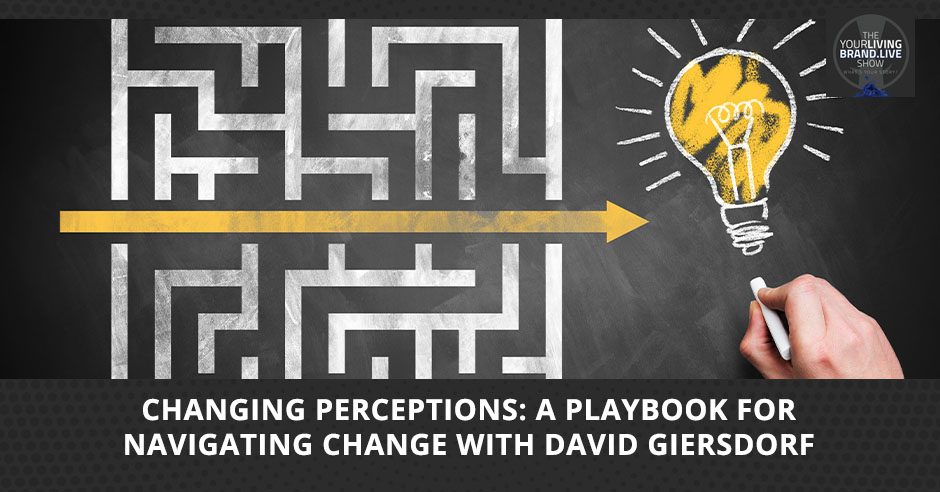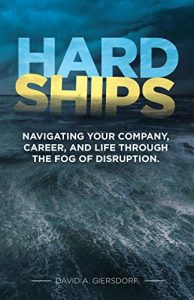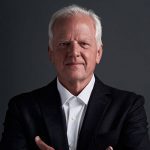
Along with the changes in the world must come changing perceptions. We deal with changes in how we perceive others, be it personally or professionally. In this episode, Ben Baker discusses change and disruption with business consultant and entrepreneur, David Giersdorf. David is the founder of Global Voyages Group. Here, he discusses how to deal with disruption and leveraging leadership, curiosity and engagement. Tune in for more great insights into entrepreneurship from top entrepreneurs.
—
Listen to the podcast here
Changing Perceptions: A Playbook For Navigating Change With David Giersdorf
[00:01:17] In this episode, I’ve got somebody a little different on the show because we’re going to talk about not only the travel agency, but about how we change the perception of who we are and what we do. David Giersdorf comes from many years in the travel industry. I’m going to let him tell his story because it’s an incredible thing. He is the author of a book called Hard Ships: Navigating Your Company, Career and Life through the Fog of Disruption. David, welcome to the show.
[00:01:49] Ben, thank you. I’ve been looking forward to our chat. I hope we find some interesting and relevant topics for your audience. God bless them for seeking perspective and insight, and you for giving it to them. It’s a great pleasure to be here.
[00:02:04] You and I have had so many conversations on a variety of different things. I sat there and said, “I’ve got to get David on the show.” You come from an industry that is probably one of the least understood out there, the travel industry. People have very little understanding of what goes on in the back. People sit there and they understand, get to the resort, sit on the beach, get their Piña Colada and then go home.
They don’t understand what happens to make the magic happen. You’ve had a front-row seat for pretty much your entire career to be able to enable that amazing customer experience that you’ll get. People not only have those experiences but tell those experiences to others. Why don’t you give us a little bit of in-depth understanding of who you are, where you came from, and what brought you here?
[00:03:01] Experience is the term that ties it all together for me and the many millions of guests I’ve helped serve as they pursue their dreams of a travel experience. I was into the travel business to a degree. I was born in the frontier of Fairbanks, Alaska, before statehood. My father was very young and a single-parent entrepreneur. He’s an amazingly creative man.
He had his early career with Alaska Airlines, helping to build that scrappy little regional carrier into a major force in the airline industry and look where it’s gone now. It’s amazing. I had a front-row seat to a single-parent father. How did he take care of me? I came to the meetings. I sat quietly with a little bow tie in a sports jacket through dinners and meetings. I played behind airline ticket counters, watched by the staff at the counters. I played in the hangars where these big planes were prepared and worked on. It was quite an interesting inside look at one aspect of the travel industry, aviation.
Leadership is about communication. It's about vision. It's about leading by example, alignment and results. Share on XAfter Alaska Airlines, and when I was about 13, my father formed what became our family business. He left the airline and began a tourism enterprise in Alaska. His vision and creativity were to make the real Alaska accessible to visitors. That meant that we undertook the great task of opening up the Arctic to tourism, working with small communities and native corporations to put hotels, and organize activities in place.
We chartered 737 airplanes daily, 2 a day so that we could run a cycle of 2-day, 1-night tours from Anchorage and Fairbanks up to the Arctic, so people could experience the real Alaska across the Arctic circle, see the midnight sun, learn about authentic native subsistence culture. It’s spectacular. That idea grew to many parts of Alaska that we developed the Pribilof Islands, the Galápagos of the North, far out on the Aleutian chain.
We owned and operated the National Park Concession at Glacier Bay. One of the most famous tourist destinations in Alaska for many years, the lodge and the tour boats to the glaciers and the lake. There are so many experiences in Alaska. We broke out of Alaska with a small ship cruise line called Exploration Cruises. Small ships carrying no more than 100 people were designed to go where big ships couldn’t, just as we were doing with the Arctic and our other destinations, that concept and idea straight into a real authentic experience.
Our fleet of vessels ultimately operated not only in Alaska but on the Columbia and Snake Rivers in the sea of Cortez, Costa Rica and Panama, Tahiti, French Polynesia and even in Europe in the Deep Caribbean. We built a capital, operational and experience-intensive business. This was in the first 30 years of my life. We sold that business to a very large corporation, and that jettisoned me then into my next level of career in the global business.
That was when I joined Carnival Corporation and became the first General Manager of Windstar Cruises, a boutique luxury experience brand that was owned and operated under Carnival by Holland America Line, which is a Carnival company as well. Here’s where I learned big business publicly-traded disciplines different from the entrepreneurial discipline. Entrepreneur, if it’s Thursday, must be paying payroll, “How are we going to pay that? Where’s the money going to come from?”
It’s the reality of bootstrapping. A lot of people don’t have the continence for it. My father did it many times over. He’s an amazing entrepreneur. I learned some of those things from him. I learned a lot of things from the MBA corporate world as well. That’s served me well throughout my career. I had a wonderful career with Carnival Corp and rose to the number two position in Holland America Line.

It’s a billion-dollar-plus operating company with 14,000 employees on ships all over the world. I was primarily responsible for the product development and design, the ship deployments, the planning, the marketing, sales and distribution and the brand positioning of the company. We went through some amazing times with that company and in the industry.
After Holland America, I returned to my passion, small ship cruising. I served a stint as the CEO of Paul Gauguin Cruises, a luxury line in the Pacific of American West Steamboat Company and Delta Queen Steamboat Company under a holding company called Majestic America Line and then through my own company, Global Voyages Group. I’ve consulted, advised and helped go to market at least twenty global experiential cruise and travel brands. What I have the most fun doing is advisory work, go-to-market strategies and activities for specialty cruise and travel companies.
In essence, it’s connecting the customer who’s seeking the most extraordinary experiences with the companies that provide the most extraordinary experience. It’s a needle in the haystack. It’s hard for those companies to find that type of customer and it’s hard for these customers to sort the marketplace and find those smaller companies who have such a small voice in the marketplace. I have a lot of fun helping on both sides of that. It made me a great facilitator of knowledge between consumers and cruise operators.
I think a lot about this industry. I have a lot of experience under my belt. I wrote a book, Hard Ships and thinking about the years of being on the front line of building a global industry, such as cruise and a truly global multicultural and international in every way, being subject to every disruption possible along that growth path, geopolitical, financial, health and operational, it’s all there. We’ve had to deal with it as an industry. Sometimes I’ve had to deal with it in my role as a leader. The lessons from that I stepped back and thought about because I journal.
I’ve always journaled in my life. I was able to look back on the journals to those periods of great disruption in the marketplace and my company. That’s why the book is in your company, in your career and in your life because the first thing I observed was it’s rarely one, it affects all. The second thing I observed was that I landed on a repetitive set of protocols for dealing with disruption, acknowledging it, adapting to it and moving through it and out of it successfully. That’s also the story of the cruise industry. It’s an industry that keeps growing, even with this big disruption. Twenty-two new ships in 2012, a $12 billion investment, the machine keeps going. That’s a little bit of color regarding my background.
[00:10:38] Let’s go back to the very beginning because I find it fascinating being the son of a single dad who sat there and said, “I’ve got a job to do. I’m growing this empire which ended up being Alaska Airlines,” before the cruise thing and bring you along. The fact that I could see you in your jacket and bow tie sitting in on meetings, being behind the counters and involved in the actual daily operations. What are the things that you learned early on in those days that probably gave you the best insights to be able to be successful in a career and enable other people to be successful in their careers moving forward?
Thinking starts where information ends. Share on X[00:11:23] That was a scrappy startup frontier environment. The very first thing I learned was the power of creativity. The ability to think creatively, to be determined, to find a way forward, through, around, over or under didn’t matter. There was a commitment to build, succeed, grow and accomplish things. That takes a deep level of passion.
The other lesson was you have to be passionate about what you’re doing if you’re going to do it at scale and with high impact. Another key area was the area of leadership. Leadership is about communication, vision, action, leading by example, alignment and results. I saw the good and bad of that as I was growing up. I was blessed with being able to see a range of examples of good and bad.
[00:12:25] If anybody who thinks that leadership is all roses and everything goes smoothly never led.
[00:12:33] Those were some early lessons, passion, determination, creativity for problem-solving, creating a resource where it doesn’t exist and alchemy in a sense. That has served me well. It’s made me unique in the larger business world. I have that in my DNA and tool kit when I sit in a meeting or lead a team and explain.
There’s a key lesson that my father shared with me. He said, “Son, when your objectives aren’t being met, you’re frustrated with others and it doesn’t seem like everyone’s on the same page, take responsibility for it. The first place to look is, ‘Am I communicating effectively, clearly and consistently?'” That always stuck in my head to hear my dad with this high as I revered him, with all those accomplishments to say, “When I fail at something, to convince and prevail, the first place I look at is me.”
[00:13:39] That’s a brilliant thing because so many leaders are going, “Why don’t they understand? Why aren’t they doing what I want them to do? Why aren’t they following the mission, vision, values and things that I’m laying out?” The question is, are we communicating effectively? Are we telling the right story? Are we telling it in their words, not ours? Are we making it relevant to them? Not us. Are we painting a picture in their minds of why they are individually important to the success and what you need from them for the overall project to succeed?

[00:14:14] Why does it matter to them that it succeeds?
[00:14:19] That’s a challenge of leadership. The business that I’m in and I love is being able to help that communication, but that’s an insightful thing for your father to teach you at a very young age to sit there and say, “We need to take responsibility.” We need to sit there and say, “If something isn’t going right, first of all, let’s look within. What have I done wrong? What have I not communicated effectively? What can I do differently to make this work properly?”
If the answer is nothing, then you can go look elsewhere but having that introspective look to begin with is a powerful thing that enables you to be a much better leader, both on a small scale and a large scale to be able to sit there and say, “I’m going to take ownership. I want the big chair. I want to grow this.” How has that enabled you to not only succeed yourself but also to teach the next generation of leaders to step up into their chairs and be successful in their right?
[00:15:30] What we’re talking about is I described as stepping back for a moment and re-engaging. We always have that opportunity to step back, reflect, re-engage, try a different approach and tweak the formula and message. We can do that repetitively on any issue. That’s one thing that I share with others. The other thing I share and try to mentor is a simple concept to me thinking starts where the information ends.
We’ve become so buried in data. It’s so readily accessible. We’ve become the laziest thinkers. Why should I calculate it if I can verbally ask Google? I’ve seen so many times with younger professionals who are so engaged with technology and in decision-making. I’ve seen them reach a logical but wrong conclusion and fail to think about what they know about the business.
Why do you accept this number? It’s not reasonable given our experience to date or your experience. What makes you think this could be the right answer or calculation? You’ve allowed yourself some confidence in your experience and gut. This could become more critical for our species as AI becomes a powerful tool that hopefully we harness rather than become harnessed by.
No one will take your brand more seriously than you. Share on XAI is only as effective as the quality of the human perception, creativity and experiences that engage it. One of the things I teach is thinking starts where the information ends. You’ve gathered all the information and got lots of stuff, “Tell me why based on this experience, this information matters. “What’s most relevant in it? What do we learn from it? What does it suggest about what to do next?”
[00:17:40] It’s garbage in and garbage out. I was on another podcast and we were all talking about dashboarding. Everything’s being dashboard, whitewashed, sanitized and brought up the ladder because nobody wants to look stupid when they’re bringing up the information. Either they omit, ignore or sanitize the information as they’re leveling it up to be able to make their department or themselves look better in the case.
By the time the information gets up to a decision-making level where people can look there and make a decision, do they have the right information at their fingertips to make a logical decision? Are they able to trust the information in front of them that’s going to enable them and the organization to be successful?
[00:18:30] I was fortunate when I came up through the business. We used Excel to gather and report data. We had to add a layer of understanding to all those hundreds of pages of data. You’ve got fourteen ships operating all over the world and departing weekly.
[00:18:51] With 2,000 people on a ship at least.
[00:18:54] An annual capacity of close to one million customers and a perishable product. As each day goes by and a future bed has gone unsold, it becomes more at risk of not being sold. If it makes it to the finish line unsold, revenue and profit opportunity are lost forever. It’s truly perishable. In the cruise business, one lives in a relentless race against time and capacity always. What we’re looking for are the anomalies. What’s not progressing at the pace necessary? Different cruises of different lengths and different parts of the world all have different ideal progress basis, so you’re discerning that.

You’re also discerning what’s outperforming and where I have an opportunity to adjust price or policy to perform better where demand seems to be more on my side. That was all being done manually with the support of Excel sheets. For our weekly and monthly strategy meetings, we would consume hundreds of pages of data and analysis. In doing that, you develop quite a skill for seeing the wrong numbers and things that can’t be right.
Quickly absorbing a tremendous amount of data into your mind sorting it, arriving at conclusions that drive action and communicating to others why those conclusions are good and why they should be acted on. With the dashboards, I don’t care if it’s Tableau, Power BI, or any of those tools that we see in business. Others are making decisions for you about the information you consume because those dashboards have to be fed with data feeds. You are no longer seeing those data feeds.
[00:20:56] You’re seeing the snapshots.
[00:20:59] That’s a different kind. Great things are being done with those kinds of tools. I use them to speak about relevance, but it’s different. There is something about engaging the brain a little more deeply around all this data that is critically important for leaders.
[00:21:48] Let’s use that as a push point to talk about changing perceptions of who we are and what we do. You talked about the word alchemy. That word has been gnawing at my brain because we’re always constantly changing, reinventing, morphing, and repositioning ourselves to be able to sit there and say, “Who do we need to add value to? How do we add value to these people? Why do they care? How do we motivate them to be able to care about the same things that we care about?
Especially in the cruise industry, it’s a commodity product. How do you take people from viewing a cruise as a commodity and saying, “I want something that’s $400 a day versus $800 a day, versus $1,200 a day,” to turn that into a thought of, “I want this type of experience, be treated like this, and be able to tell these types of stories,” either consciously or subconsciously and be able to move people from seeing you as one of many to one of one?
Technology is more about what's next than what is at the moment. Share on X[00:23:05] That’s a couple of interesting things. To your point, the cruise industry from the outside looks quite glamorous and fantastic. It is all of those things, the big beautiful ships, the most colorful harbors and ports of the world, all the oceans and waterways, river or ocean. It’s an amazing industry to look at and take note of. Behind the scenes, it’s one of the most operationally intense and challenging businesses on earth.
I underline on earth because these smart cities operate 24/7 on all waterways in all time zones in all parts of the world. It is quite a remarkable achievement to deliver the experience and deliver it at an amazingly efficient cost compared to other vacations because that’s necessary to operate at scale. As a lesson in the industry, no one will take your brand, be it your company or your person, more seriously than you. Pay close attention to how you value your brand, what you value about your brand and how you express it.
If you express your brand as a price-driven commodity, that’s what you get back from the marketplace. “They all look alike, $400 each. I’ll go with the one that’s $399.” That’s what you get. If you express your brand as a life-changing, deeply inspiring, gain new experiences, make new friends, see new sites, things that don’t have a direct dollar value, things that have a life value, that’s how you, in my view, position and experience.
I designed an expedition Alaska product for a company. It’s spectacular. When I design a product, I think about the experience and then 10X. If we’re going to differentiate among all the small cruises of Alaska, what does that science team on board look like? What are their specialties? What are they teaching? What’s it like when we pull into the cascading waterfall coming thousands of feet out of the mist granite cliffs of Misty Fjords National Monument? What do we want to learn about glaciology as we bump and grind away among the ice as we approach a glacier to watch it calving? What about the sounds, the mating and eating behaviors of the humpback whales out there in Frederick sound?
How do we get scientists hydrophones on board and bring this whole story out? What about the first nations people, the authentic citizens of this spectacular wilderness and their stories, traditions and way of life? I go boom and boom. When you do an experience by David Giersdorf, you’re going to have stories to tell and memories you’ll never forget. That’s passion and something I learned in my early years that’s going further and further. That competitive spirit is, “I want to do it better and different.” If people can bring that to the table in any industry, make a mark.
[00:26:41] I think back to the Disney way because I’m a Disney kid. From the time I was knee-high to a grasshopper, I went to the parks, and I still love going to the parks. I love the experience. I think of the way that Disney is trained. Is it perfect? No. It’s about as close of thought and analogy as I can think of. Every single person, from the person that collects your ticket, to the person who sweeps up the garbage, to the person who puts you on a ride, to the people in the back, making sure that your safety is all there, everybody is thinking about the Disney way.

Everybody is thinking about the customer experience, “How do we create this one overall overarching experience to differentiate ourselves and let people understand who we are, what we do and why we do it?” How do we sit there and create that knowledge base and training development to make sure that everybody within your experience is speaking from the same place, feels the same way, and understands their role in making the mission successful?
[00:27:57] I can answer that with one key principle and that’s purpose. A purpose is bigger than you, compelling, big enough, strong enough and clear enough to align the efforts of everyone. If that purpose is expressed and understood, then the how, the principles, the goals and the methodologies can be embedded to support it, but it starts with purpose.
Often companies start on the operational end and try to build up and find a purpose. Much better to start with a purpose and fill in from there. Walt Disney himself had quite a purpose. If we went back in time, we’d see that he probably has a one-liner that clearly states it to the world and that purpose probably is still thriving, the delivery of the Disney experience.
We’re talking about how do you stay relevant? How do you change perceptions about what we do and who we are? That came from my discussion about change is happening so rapidly. Disruption impacts people’s lives. I’ve had to deal with a lot of colleagues who were fairly senior in their careers and were fearful. “I’m over 50. Nobody wants me. My skills don’t align with the marketplace anymore. My value proposition is gone. I’m scared.”
That’s what they’re saying between the lines, “I’m scared.” What I share with people and the reason they share this with me is that they look at me and say, “How is it that you keep going? You’re so engaged.” For our chat, I made a couple of notes that I might share that maybe they’re helpful to some of the good folks reading this.
I feel like maintaining relevance starts with mindset and vitality. When I hit 50, I looked around. I’ll say, “I see the train coming at me. What did I do?” I became an Ironman athlete. I will transform my physical state so that everybody around me knows I can go the distance. I am a vital physical force and presence when I step into a room, have a conversation or sit at a table. That’s an important part of relevance. It’s ageless.
Have the drive to be a better person, to contribute more, to do better, to be that extra 10% in everything that you touch. Share on XVitality is ageless. It overcomes the perceptions of age. That was important to me. Technology, I better be astute regarding new technologies, their use and their application of them. Not only that, I better have a perspective on where technology is going because technology is more about what’s next, more so than what is at the moment. That’s a simple fact.
That’s why I became an investor and a limited partner in Seven Peaks Ventures, which is a very highly regarded venture capital firm based here in Oregon. Through that position, I get to see a lot of the brightest youngest minds and the greatest technology concepts and inaction in the marketplace. It keeps me relevant. I can be in any conversation in any company. When technology comes up, I have something to contribute. That’s part of relevance.
I like to suggest to people, “You’re not a victim of circumstance. You’re a player on the field. You missed the shot, so what? Take another one. The other team ran you over? Get up and get back in the game.” You have to have a player mindset to stay relevant and vital. You have to have a principles-based ecosystem.
We talk a lot about the purpose that expresses those principles, goals that support the purpose, habits and methods that enable the goals. I pay close attention to those things in my life and my work. You’ve got to embrace your value. It was Malcolm Gladwell in Outliers who shared with us the idea of the 10,000-hour rule. There are 100,000 hours of professional experience that went behind my ability to write Hard Ships, the playbook.
When someone engages with me for 1 hour of my advice, they’re drawing on 100,000-plus hours of experience and expertise. People shouldn’t think about why they’re not relevant anymore. They should think about why they are relevant and valuable and what they have to embrace their value to tap into and bring it out. Be visible and accessible. I always am. You can’t be relevant if you’re invisible. Find ways to be visible and accessible to help and contribute to others.
I believe in karma. Whatever I give in terms of making myself accessible and helpful to people who are going through transitions or challenges or even brainstorming, an idea comes back to me in many folds. That’s a lesson to learn about staying relevant as we get further along. It’s something we’re uniquely able to do and offer to others.

Becoming an expert at dealing with and leveraging disruption is important. The rate, scale and kinds of disruption are only increasing. The more prepared we are and the more we have a playbook for dealing with disruption, the less we’re going to be knocked off our horse and for shorter periods when we are. Curiosity, open-mindedness and engagement are essential. Older minds tend to become more rigid minds. That rigidity will make you less relevant.
[00:34:22] Those are incredible thoughts. People need to sit back and read it again because there were some real gems in there. I want to ask you a couple of quick questions because I promised you we were going to talk about journaling and I want to make sure that we talk about that. What is the one lesson that you learn that journaling has provided you and will help make other people successful moving forward?
[00:34:54] It’s self-awareness, how I operate or what makes me tick. One form of journaling is, “I did this, that and the other.” Another form of journaling is, “There’s something I’ve been thinking about. I want to take a moment here and work it out. Here’s what it is. I’m thinking about it.” In that process, you find that you do work things out. Maybe not all at once but over time.
I challenged myself with questions. I have the drive to be a better person to contribute more, do better and be that extra 10% in everything that I touch. A lot of my journaling is about how to do that. What are my goals? How are my actions aligning? What are my disappointments? What are my celebrations? After many years of that, you continuously gain some insight into yourself and possibly others. We talked about stepping back and re-engaging. It’s a form of almost daily stepping back and re-engaging.
[00:36:08] It probably gives you a great insight into where you’ve been and where your thoughts were versus where your thoughts are now, and gives you some insights to move forward. Two quick questions before I let go. The first one is how do people get in touch with you?
[00:36:22] I’m on LinkedIn, so if anyone is on LinkedIn, follow me, David Giersdorf. I’m happy to connect, benefit from your contributions and share mine. The second would be DavidGiersdorf.com. The third is at Amazon with my book, Hard Ships. I have a simple little web address called GetHardShips.com. It will take you straight to the Amazon page available, Kindle audio, softcover and hardcover. There’s some good content in there for everybody for a variety of circumstances. That’s it.
[00:37:04] Here’s the last question I ask everybody before I let them out the door. As you leave a meeting and you get in your car and drive away, what’s the one thing you want people to think about you when you’re not there yourself?
[00:37:18] High impact and contribution. “I’m glad David was part of that conversation and discussion. He brought great thoughtfulness, insight and tangible recommendations to the party.”
[00:37:36] David, you’ve certainly brought a lot of great tangible ideas and information to this conversation. Thank you for being a wonderful guest, for your insights, and for your generous information for my audience.
[00:37:49] It’s my pleasure. Thanks for the opportunity.
Important Links
- David Giersdorf
- Hard Ships: Navigating Your Company, Career and Life through the Fog of Disruption
- Global Voyages Group
- Outliers
- LinkedIn – David Giersdorf
- Seven Peaks Ventures
- GetHardShips.com
About David Giersdorf

David A. Giersdorf is an innovative entrepreneur with extensive C-suite experience as a former senior executive in the global cruise, travel, and marketing services industry, including directing a $1B+ Brand Portfolio and serving as CEO of several iconic cruise lines, travel, and marketing services companies.
David is the Founder of Global Voyages Group which helps Owners, Boards, CEOs, and Leadership Teams of diverse companies and organizations on topics ranging from Navigating Disruption and Recovery, Growth, Innovation, Performance, and Mergers & Acquisitions. He greatly enjoys helping companies and their teams envision the opportunities and challenges of the near and further future, innovate continuously, and create sustainable value for all stakeholders. David is a former Chairman of Cruise Lines International Association (CLIA) and
numerous other industry and civic organizations. Giersdorf attended the University of Washington and completed a Northwestern University Kellogg School of Management Program in Entrepreneurship.
David is also the author of Hard Ships: Navigating Your Company, Career, and Life through the Fog of Disruption, which details his four decades of experience navigating brutal disruptions to achieve innovation and growth.
David greatly enjoys helping companies and their teams envision the opportunities and challenges of the near and further future, innovate continuously, and create sustainable value for all stakeholders. Companies, clients, and close friends know David for disrupting disruption.
When disruption is upon you, there is what happens around you, how it affects you, and what you are going to do about it. Do the opposite of nothing, David advises.


